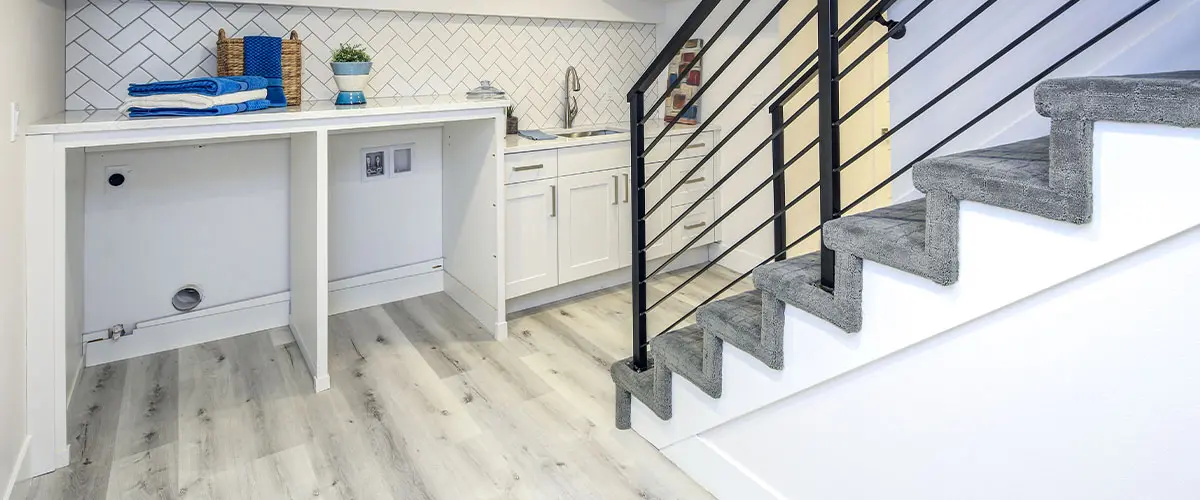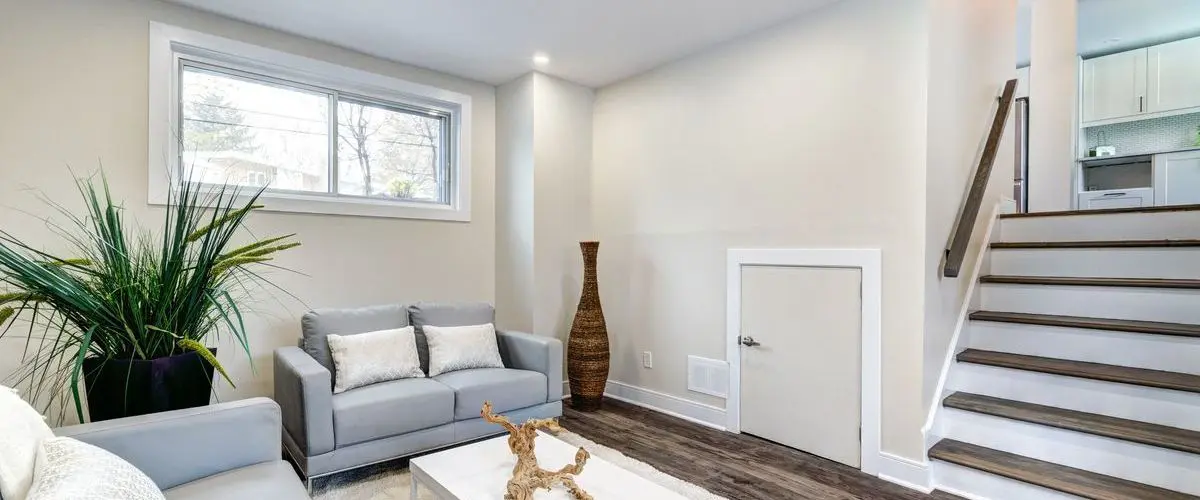Best Flooring For a Basement That Floods
Transforming a flood-prone basement into a durable, stylish space is within reach with Mortise & Miter.
Our guide on selecting the best flooring for basements susceptible to flooding arms you with essential knowledge, ensuring your basement remains a functional and appealing part of your home regardless of the weather’s whims.
Keep reading to make an informed decision!

Factors to Consider When Choosing the best Flooring for a Basement that floods
When choosing flooring for a flood-prone basement, consider the existing flooring conditions and the level of moisture and water resistance required.
Ensure the durability of the flooring against potential flooding while looking for suitable options that can withstand such conditions.
Existing flooring and its conditions
Before deciding on new flooring, take a close look at the existing flooring in your flood-prone basement. This step is crucial because the current state of your floor plays a big role in your choices.
Some basements have concrete floors that may show signs of moisture problems or cracks. Others might have old carpet or wood that has been damaged by water over time. Identifying these issues early can save you from future headaches and ensure you pick the best option for durability and flood resistance.
The condition of your basement’s concrete foundation also matters. If there are very few seams or if it’s mostly smooth, then certain options like luxury vinyl plank flooring or ceramic tile can provide excellent coverage with minimal risk of water seeping through.
Knowing the specifics helps tailor your search for materials that not only look good but also stand up to the challenges of a flood-prone area. Next, consider factors like moisture and water resistance to further narrow down your choices.
Moisture and water resistance
Moisture and water resistance are crucial for any flooring chosen for flood-prone basements. Floors must withstand not just standing water from floods but also the high humidity levels that can linger long after the water recedes.
Vinyl flooring, especially luxury vinyl tile, offers excellent moisture barrier properties, making it a top contender for such challenging environments.
Rubber flooring follows closely behind due to its innate ability to repel water, preventing mold and mildew growth which is common in damp conditions.
Choosing materials with inherent water-resistant qualities helps safeguard your basement floor against damage during unforeseen flooding events. Ceramic tiles stand out as another strong option because of their durability in wet conditions and ease of cleaning post-flood.
Meanwhile, options like epoxy flooring create a seamless surface that leaves no space for water penetration, defending your basement against potential moisture damage efficiently.
These solutions aim to provide peace of mind by offering both protection and longevity under moist circumstances commonly found in flood-prone basements.
Durability
Durability is a crucial factor for basement flooring, especially in flood prone areas. Floors that can withstand frequent water exposure without deteriorating quickly are essential.
Look for options like rubber flooring or luxury vinyl plank as they hold up well against moisture and heavy usage. These materials resist wear and tear, making them reliable choices for a high-traffic area like the basement.
Selecting durable flooring means you won’t have to replace it often, even after flooding events. Products designed with flood-prone basements in mind offer better long-term value.
They save time and money by avoiding frequent repairs or replacements due to water damage.
Prioritize durability alongside water resistance to ensure your basement floor stands the test of time despite any challenges.

The Best Flooring Options for Basement Flooding
Luxury vinyl plank, ceramic tile, epoxy flooring, rubber flooring, and engineered hardwood are the top choices for basement flooring in flood-prone areas.
Each of these options provides excellent water resistance, durability, and ease of maintenance to keep your basement looking its best despite potential flooding.
Luxury vinyl plank
Luxury vinyl plank is an excellent choice for flood-prone basements due to its water-resistant properties. It is made of multiple layers that provide durability and resistance against moisture, making it a practical solution for areas with high humidity.
The installation process is straightforward, with options available for floating or glue-down applications, adding versatility to its appeal.
Its authentic wood or stone appearance gives homeowners the benefit of luxurious aesthetics without the worry of potential damage from flooding.
Moreover, luxury vinyl plank flooring also offers easy maintenance and cleaning, requiring only regular sweeping and occasional mopping to keep it looking pristine.
This option’s resilience against water makes it an ideal solution for homeowners seeking reliable protection against basement floods.
Ceramic tile
Ceramic tile offers a durable and water-resistant option for basement flooring. This type of flooring is well-suited to withstand potential flooding, making it an excellent choice for flood-prone basements.
Its moisture resistance prevents water damage, and its durability ensures long-term performance in challenging conditions such as raised humidity levels or occasional flooding.
Furthermore, ceramic tile is easy to clean and maintain, requiring minimal effort to keep it looking fresh and appealing. Its versatility also allows for various design options, from stone floor aesthetics to tailored patterns using latex flooring adhesive.
The robust nature of ceramic tile makes it a reliable solution for homeowners seeking flood-resistant flooring that will stand the test of time.
Epoxy flooring
Epoxy flooring provides a durable and water-resistant solution for flood-prone basements. Its seamless and impermeable surface prevents moisture from seeping through, making it ideal for areas with frequent water exposure.
This type of flooring is also easy to clean and maintain, requiring minimal effort to keep it looking new. Epoxy flooring can be customized in various colors and finishes, adding a touch of style to your basement while safeguarding it against potential flooding.
When properly installed, epoxy flooring creates a protective barrier that withstands the challenges posed by moisture and flooding, ensuring long-lasting performance in a raised floor setting or flood-prone environment.
Rubber flooring
Rubber flooring is an excellent choice for flood-prone basements due to its water resistance and durability. It offers a resilient and comfortable surface that can withstand moisture without warping or deteriorating, making it ideal for areas prone to flooding.
Its slip-resistant properties make it a safe option for wet environments, providing added security against accidental slips and falls.
The versatility of rubber flooring allows for easy installation over existing surfaces, reducing the need for costly subfloor preparations. Its low maintenance requirements make it an attractive option for busy homeowners looking for practical solutions.
Rubber flooring provides a seamless blend of functionality and resilience, making it an optimal choice for basement spaces susceptible to flooding.
Engineered hardwood
Engineered hardwood flooring is a top choice for flood-prone basements due to its durability and resistance to moisture. Unlike traditional hardwood, engineered hardwood is constructed with multiple layers that provide stability and protection against water damage.
The top layer of real wood gives it the natural beauty of hardwood while the layers beneath offer added strength and resilience against potential flooding.
This type of flooring offers a high-end look, easy installation, and can withstand the challenges posed by basement flooding.
When selecting flooring for a basement prone to flooding, considering engineered hardwood can be beneficial due to its ability to resist moisture while providing an elegant appearance.

Installation and Maintenance Tips for Flood-Resistant Flooring
After selecting flood-resistant flooring for your basement, ensure proper installation and regular maintenance. Follow proper installation techniques and schedule regular cleaning to maintain the flooring’s durability against potential flooding.
Regularly inspect the flooring for any damage and promptly repair it as needed.
Proper installation techniques
- Preparing the subfloor: Thoroughly clean and level the subfloor before installation to create a smooth and even surface for the new flooring.
- Using proper adhesives: Use appropriate adhesives recommended by the manufacturer to ensure that the flooring material adheres securely to the subfloor.
- Allowing for expansion gaps: Leave expansion gaps around the perimeter of the room to accommodate potential changes in the flooring due to humidity or temperature fluctuations.
- Following manufacturer guidelines: Adhere strictly to the installation guidelines provided by the manufacturer of your chosen flooring material for optimal performance.
- Securing edges and seams: Properly secure edges and seams to prevent water infiltration and ensure a watertight installation, especially in flood-prone areas.
- Applying sealants: Consider using sealants or waterproofing products as an additional layer of protection against potential water damage.
- Hiring professional installers: When in doubt, rely on experienced professionals who specialize in flood-resistant flooring installations for expert guidance and execution.
Regular cleaning and maintenance
- Sweep or vacuum the floor regularly to remove dirt and debris.
- Clean the surface with a damp mop using a mild detergent or specialized cleaner recommended for your flooring type.
- For tough stains, use a soft - bristled brush or sponge to gently scrub the affected area.
- Avoid using harsh chemicals or abrasive cleaning tools that could damage the floor's surface.
- Dry the floor thoroughly after cleaning to prevent moisture - related issues.
- Consider applying a protective sealant or topcoat as recommended by the manufacturer to enhance durability and resistance to water damage.
Repairing any damage
- Assess the extent of the damage and identify the cause.
- Remove any affected flooring materials carefully, ensuring no further harm is caused.
- Dry out the area thoroughly before installing new flooring to prevent mold growth.
- Inspect and repair any underlying foundation or subflooring issues contributing to the damage.
- Install replacement flooring using recommended techniques and adhesives for flood - prone areas.
Choosing the Right Foundation for Flood-Prone Basements
In the quest for a basement that can gracefully weather the storm, understanding your options is half the battle.
This guide aimed to arm you with the knowledge needed to select flooring that stands up to the challenge of occasional flooding, ensuring your space remains functional, stylish, and above all, resilient.
From luxury vinyl plank to ceramic tile, the right choice not only reflects your style but also brings peace of mind during the rainy season.

FAQs
Consult with Mortise & Miter: Your Flooring Solution Experts
Selecting the ideal flooring for a basement vulnerable to flooding is a crucial decision. At Mortise & Miter, we specialize in navigating these challenges, offering expert guidance tailored to your unique needs.
Don’t navigate this decision alone. Let the professionals at Mortise & Miter assist you in finding a flood-resistant flooring option that aligns perfectly with your requirements and aesthetic goals.
Contact Mortise & Miter today for personalized advice and embark on the path to a wisely chosen, durable basement flooring solution. (913) 214-6211

